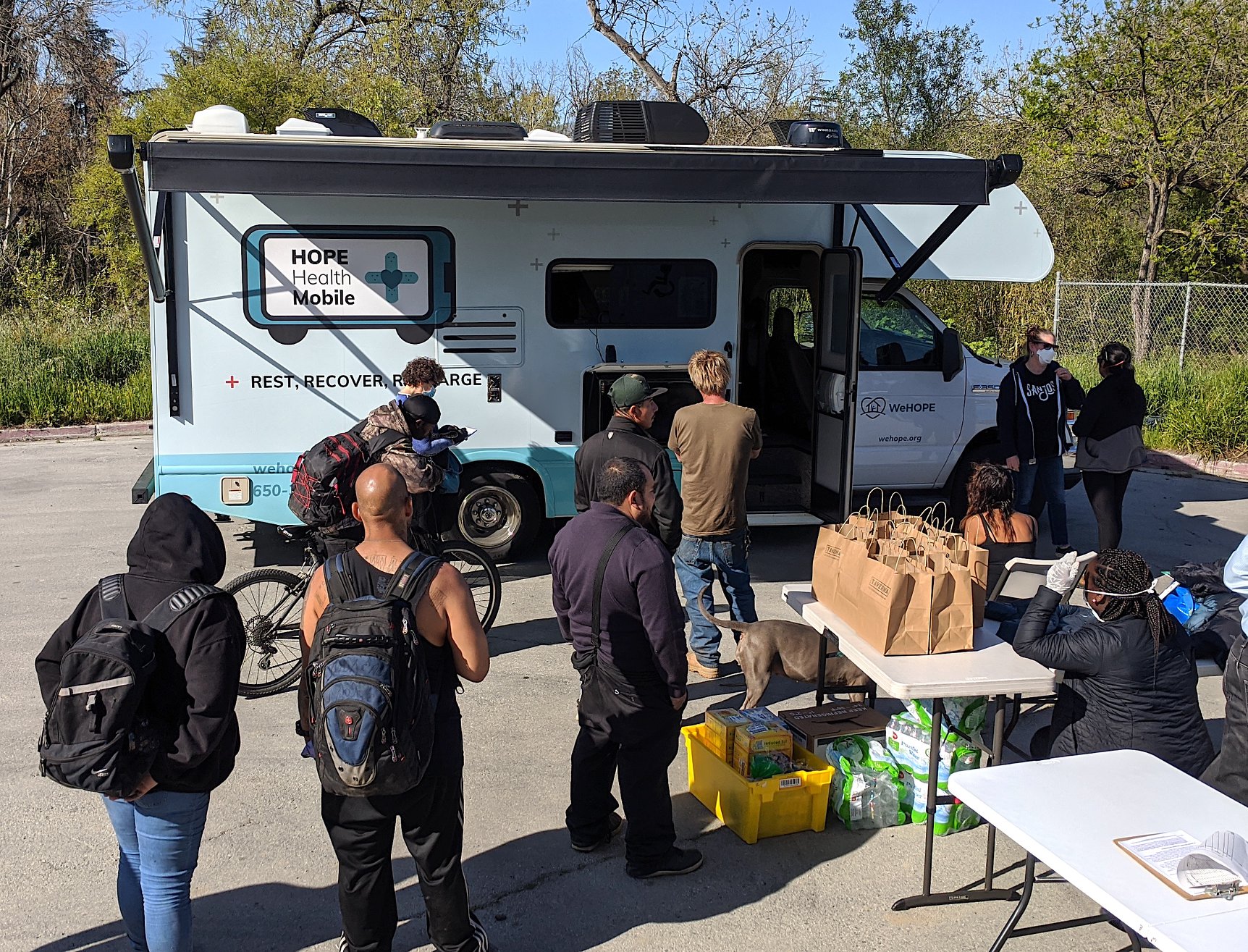When the threat of COVID-19 pulled fourth-year medical student Natasha Abadilla from her night shift at Lucile Packard Children’s Hospital, she found herself suddenly sidelined from her hospital work and studies as a global pandemic unfolded.
“I went from … really helping, in a way that I could see myself helping patients, and then just doing nothing,” she said.
Between online classes or leaves of absence, Abadilla and a few of her peers have turned to a local nonprofit to get involved in the COVID-19 crisis and keep their medical studies fresh in mind. Abadilla now fundraises for Project WeHOPE, which serves homeless communities in the Bay Area. She spends her Fridays with other Stanford medical students providing advice and information on COVID-19 to homeless communities over Zoom.
Abadilla, who taught health-education classes as a volunteer for Project WeHOPE before the outbreak of COVID-19, began a fundraising drive for the organization in late March after COVID-19 dramatically increased the demand for Project WeHOPE’s services. The nonprofit runs a shelter in East Palo Alto, provides food donations and operates a mobile laundry and hygiene service for homeless encampments across the Bay Area.
“Because of shelter-in-place, all of the public parks have closed so the bathrooms and sinks are closed,” Abadilla said. “The 24 Hour Fitness, which is like the cheapest gym that [homeless] people sometimes use for showers and stuff, or the YMCA, those facilities are closed. So now, people in homeless encampments don’t even have running water or places to use the bathroom that are not just out in the open.”
Abadilla began fundraising within Stanford’s medical student community and also assisted in purchasing supplies for Project WeHOPE’s East Palo Alto shelter. She has since expanded the drive to various graduate student communities, Stanford families and alumni groups. The drive has raised more than $5,000.
There’s been a “huge response from the grad community,” Abadilla said. “It was really nice. Once someone sent [the fundraiser] to their GSB or their Chem department list, I would get dozens of emails like within the next hour of people wanting to donate.”
Abadilla, along with fellow fourth-year medical students Emmy Shearer and Jake Mooney, also volunteers for Project WeHOPE’s newly established mobile health program, which provides coronavirus information and medical advice to homeless communities. On Fridays, Abadilla, Shearer and Mooney hold online Q&A sessions for different homeless encampments, broadcast through a TV screen mounted on the side of a modified WeHOPE camper van.
“A lot of it was just making sure that accurate information was getting spread about what are good, safe hygiene practices, what’s the current state of available treatments, or projections of where this was all going,” Mooney said, “… just trying to make sure that these populations aren’t feeling left out of the loop.”
Pedro Cedillo, a coordinator for Project WeHOPE, said the new program has been well-received.
“They [the volunteers] have been amazing,” Cedillo said. “We’ve been doing this for probably like a month with them, they’ve been providing so much information.”
Though Abadilla, Shearer, and Mooney aren’t able to formally diagnose or treat individuals as licensed practitioners, they can provide advice about health practices and accessing professional care. This plays a valuable role for the communities the charity serves, according to Cedillo.
“Sometimes [homeless people] don’t like to go with the doctor to speak because they feel rejected with the people, because they’re ‘dirty’ or they feel like it doesn’t go with the same kind of lifestyle,” Cedillo said.
Abadilla and Shearer said they would be open to more collaboration between Project WeHOPE and Stanford’s medical students in the future.
“I’d love to have people become health educators and do more when shelter-in-place is lifted and we can go there and be at the shelter to … provide more classes based on what the homeless community thinks that they need to know about health,” Abadilla said.
Shearer was “a little surprised” to find out about Project WeHOPE through word of mouth and hoped that a record could be established so Stanford Medicine students could be made aware of volunteering opportunities with the nonprofit.
“They [Project WeHOPE] are such a wonderful nonprofit, and they are so close to Stanford, and just were so enthusiastic when they heard that there were people interested in helping,” Shearer said.
Abadilla plans to continue her fundraiser through the coming months. Project WeHOPE has incurred extra costs housing vulnerable homeless individuals in hotel rooms and sustaining their vehicles and supplies as the COVID-19 crisis continues, straining the nonprofit’s own fundraising. Without in-person classes or work shifts for the foreseeable future, volunteering time is time that Abadilla has been happy to spend.
“Especially during times like these I’m glad that I have more time to fundraise for Project WeHOPE, and make it so that people know that we’re not forgetting about them and that they are being taken care of — not because we’re afraid they’re going to spread the virus … but because we actually do care about them as a community,” she said.
Abadilla asks that inquiries about donations be sent to abadilla ‘at’ stanford.edu.
Contact Daniel Wu at dwu21 ‘at’ stanford.edu.
